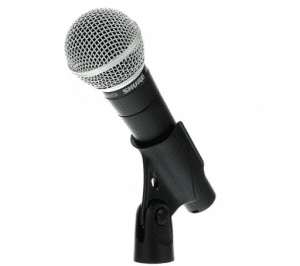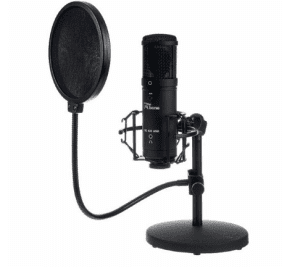
We use our voice all the time, especially us musicians. For singers, it is not only the means of conversation, but a precious instrument. And that should, and must, be treated with care. Here are a few tips for maintaining a consistently strong voice!
1. Be Aware of Your Voice’s Functionality
In order to use your voice properly, you need to know how your “instrument” works. This is a challenge that is often underestimated, especially because singing and speaking feel so natural to us. However, the fact remains: You can only consciously develop a strong voice if you understand how the vibrating vocal folds and vocal cords function, along with the position of the larynx, pharynx, and mouth, as well as tone production, breathing, and more. You need to understand your voice. One effective way to do this is by taking singing lessons.
2. Be sure to warm up – cold starts are not an option
Athletes know it: A proper warm-up always precedes performance. Muscles, tendons, joints etc. must be carefully warmed up before the, often intense, performance. The same applies to the voice, because ultimately the voice is the sum of muscles, ligaments and mucous membranes, but also resonance space, breathing and posture. If you go straight from a cold start to full load, your voice doesn’t even know what’s happening to it. Warm up every time and if anyone laughs at you before the rehearsal they surely won’t be laughing when they hear your stellar (and safe) performance!
You are currently viewing a placeholder content from YouTube. To access the actual content, click the button below. Please note that doing so will share data with third-party providers.
3. Normalize volume – neither too loud nor too quiet
Clarity in speech has little to do with volume. Instead, proper pronunciation is key; it’s always possible to articulate well at a lower volume. Speaking loudly all the time can put unnecessary strain on your voice. Of course, that’s no reason to become a quiet observer all of the time and constant whispering is actually bad for your voice. It’s about a bit of self-discipline. Just try to express yourself in everyday life with a healthy average volume and all the more clearly.
4. Strong voice: practice controlled breathing technique to perfection
Controlled breathing is probably the most important thing, both for singing itself and for long-term vocal health. In fact, its importance cannot be overestimated. Support your voice with deep, diaphragmatic, abdominal and chest breathing. Practice the breathing technique as a completely independent discipline until it literally becomes second nature to you and you basically have no choice but to support your voice while breathing perfectly. Keep yourself upright and give your voice space. It deserves it.
5. Don’t always push the limits of your pitch range
Opera singers and other vocal acrobats know that constantly pushing pitch higher can prematurely shorten their careers. Constantly singing at the extremes of your vocal range can lead to vocal fatigue or even long-term damage. Don’t always sing as high as you can. It is far better to transpose the songs a little lower. You’re not a trumpet and hopefully not a siren either.
6. For a strong voice: live healthy and avoid extremes
Musicians often live in extremes, but that lifestyle can take a toll on your voice. It starts with the diet, for example with spicy food. The problem with spiciness is that the production of gastric acid is increasingly stimulated and as a result reflux can get into the esophagus, throat and also your vocal folds and mucous membranes. If you take singing seriously, you should reduce your intake of spicy foods.

7. Staying hydrated: both immediately and spatially
Your vocal folds should never be dry, as friction can cause irritation and damage. Drink plenty of water and keep your vocal folds moist at all times. You don’t have to pour liters of drinks down your throat. We’re talking about humidification. Incidentally, this also applies to the air in the room. As far as possible, use a humidifier to ensure that the humidity in the room is around 30 percent.
8. Don’t allow dehydration in the first place
Take proactive steps to stay hydrated. If you drink caffeinated beverages or alcohol, make up for it with plenty of water. You should also avoid taking medications that could dry out the vocal folds. Incidentally, some cold and allergy preparations also belong to such voice-damaging drugs. Consult your doctor to be on the safe side.
Sie sehen gerade einen Platzhalterinhalt von Standard. Um auf den eigentlichen Inhalt zuzugreifen, klicken Sie auf den Button unten. Bitte beachten Sie, dass dabei Daten an Drittanbieter weitergegeben werden.
9. Smoking is the enemy of the strong voice
It is well known that smoking is generally harmful to your health. The particular problem for your voice is that the smoke, including the nicotine and other additives, irritates your vocal folds. And, of course, you want to avoid throat cancer. The vocal folds are among the most cancer-prone parts of the body. So don’t even start, better leave it alone.
10. For a strong voice: Don’t ignore your body’s signals
The question that remains is: What are the signals that something is wrong with your voice? In addition to how you feel when you listen to yourself and your body, there are indicators that you should not overlook, especially since they are actually warning signs. It starts when your voice has become even slightly hoarse or stuttering, or suddenly sounds deeper, and it doesn’t end with the loss of the ability to target high notes accurately when singing. The same applies if you find yourself struggling to speak or you keep clearing your throat. These issues won’t resolve on their own – consult an ENT specialist to determine the cause!
11. Don’t cheat the sound engineer and mic
Are you aware that a really versatile, and healthy, singing voice depends on your microphone technique? During sound check, for example, give the sound engineer on the desk a chance to realistically level the intensity of your voice. It is wise to hold the mic by the shaft and do not put your hand over the microphone basket. Also, keep the proper distance between your mouth and the microphone. And no, of course, don’t stand in front of the PA speakers. You voice is no match for howling feedback!

Shure SM58 LC microphone
For a strong voice: Mics from Thomann
Are you a singer in a band? Or a podcaster? Looking for microphones? You’re in the right place. Browse our online shop at this link . If you need any advice, simply call our service hotline!

the t.bone SC 420 USB desktop set
Your feedback: How do you keep your voice fit?
How do you keep your voice in the best of shape? We look forward to many helpful comments.
5 comments
Leave a Reply
You are currently viewing a placeholder content from Facebook. To access the actual content, click the button below. Please note that doing so will share data with third-party providers.
More InformationYou are currently viewing a placeholder content from Instagram. To access the actual content, click the button below. Please note that doing so will share data with third-party providers.
More InformationYou are currently viewing a placeholder content from X. To access the actual content, click the button below. Please note that doing so will share data with third-party providers.
More Information







Adrian says:
Good remarks about the working of Vocaloca chords – I would add up: Long sleep, at least 7 hours before performance
Allen Rogers says:
Well, I provide audio streaming services and I know that taking care of voice is to crucial for us as a business owner, however, thanks for providing essential information.
Joe Adambery says:
Your info is very helpful but it doesn’t specify age range that the advice can be applied too. What about senior singers over seventy must they bring down the keys in which to sing say for choral work? Non professional singing of an hour rehearsal and an hour of performance per week is what we aim for
garry Madeloso says:
I like the points your making about trying to keep the voice in good health these things are easily forgotten about weather your a professional singer or just someone who enjoys singing
Larry says:
Thanks, Garry – exactly!